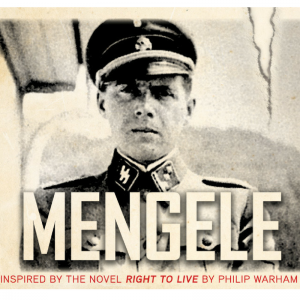 Alexander Ewers
Alexander Ewers
Mengele. A confession. A biopic. A requiem. An indictment. A warning. It is hard to know how to describe this show, or how to define its impact on the observer. The emotional palette ranges through sombre, frightening, enraging, sorrowful and every unnamed and unholy combination thereof. Mengele the man as reincarnated in Mengele the show – prepare to leave bearing an indelible imprint on mind and soul, with more questions than answers, with uncomfortable truths and comforting lies that will haunt in moments of solitude.
One of a suite of plays in Guy Masterson’s Lest We Forget season, Mengele is a brief glimpse into the mind and soul of Josef Mengele, the notorious Auschwitz “Angel of Death” as played by Tim Marriott. On the beach in which he ultimately spends his final moments, the show imagines his interaction with the enigmatic Azra’il (Stefanie Rossi). There follows a stream of consciousness, the epilogue of a soul at war with itself, as Azra’il coaxes forth a dialogue and diatribe horrifying but transfixing in its self-righteousness. It could be said to be the confessions of a dying man, except that it is no confession – it is a maelstrom of remorseless justification and consummate vanity, an unapologetic attempt at self-expungement. Mengele unleashes the undimmed ideological wolves of Nazism. Eugenics are exalted. Weakness reviled. Strength worshipped. God abhorred and cruel gods venerated. But this is no mere history lesson. Each of these motifs are disquieting in their familiarity, and parallels cannot help but be drawn to the currents of xenophobia, autocracy, and callousness… even cruelty, rippling through society today.
For 60 minutes, Marriott holds sway, delivering a performance that commandeers and manipulates the emotions. For there are moments when one feels empathy, even amity towards Mengele. But at every point, the wildest flourishes of rhetoric are contained and balanced by Stefanie Rossi, who in her debut performance as Azra’il, is every bit Marriott’s stage peer. Azra’il – mysterious, powerful, inscrutable. Completing and echoing Mengele’s thoughts in a way that simultaneously questions, refutes and placates, she possesses an insight only possible through mutually shared experience. Azra’il…. is this a reckoning with the spirit of his victims, the spirit of Israel herself? An externalisation of a moral subconscious hitherto repressed? A conversation with God, or death, or both? Perhaps all are true – for Death is Mengele’s oldest companion and in her presence, the demons of the conscience must eventually be faced.
Entertainment is too trivial a word for this experience. Factually biographic, historically accurate, culturally and socially necessary – Mengele is endorsed by Holocaust historians, advocates of Jewish culture, and theatre enthusiasts alike (New York Fringe Encore Winner). Theatrically, little stage embellishment is necessary, but two noteworthy inclusions do leave a profound effect. A montage of concentration camp scenes is interposed between the three key acts … memories replayed or perhaps simply a graphic reminder? Lending further awful gravitas, weeping Yiddish melodies lilt in and out during the play, moments when emotional composure is nigh impossible.
Doctors and gods. Doctors who are gods. Family. The elderly and the infants. The innocent. The invulnerable. Mengele touches on it all – it is theatre of both the physical and the metaphysical, painted in ambiguity and yet planting seeds of clarity. Viewers will physically depart after the hour concludes, but the deep questions the performance inspires linger far longer in the mind. How can history be merely the past when humanity IS history, and humanity is past, present and future? And where humanity treads, there always lies a choice – will history repeat, or can the future be made anew?
A must-see masterpiece, with a message more relevant than ever. Lest we forget.
Kryztoff Rating 5K







Recent Comments